Pathways to Conservation
29 October 2019It’s a rumour that we all found our calling as conservators from an early age, fuelled by a desire to disobey those DO NOT TOUCH signs in museums. At Cardiff University, our students’ paths into the heritage sector are as unique and diverse as the objects we study. In this blog, six students share their stories of their journeys into conservation.
Alice Blakely, MSc Conservation Practice (1st year)

I first heard of conservation as a career as a 16-year-old while on an archaeological dig in Israel. I thought, “hey, that’s pretty neat,” and left it at that, until I found myself in my second year of college in the US with absolutely no idea what to major in but being forced to declare a major before the school year ended. Conservation kept popping back into my head, but my school didn’t offer many conservation related majors. I settled on archaeology and minored in art history and chemistry since I thought I would go to a graduate program with hefty prerequisites in the US. Lo and behold, I ended up at Cardiff after two years of mostly unrelated work upon completing my undergraduate degree, although I did snag a conservation internship and museum job in the past year. I’m very happy to be studying conservation at Cardiff!
Josh Seymour, MSc Conservation Practice (2nd year)
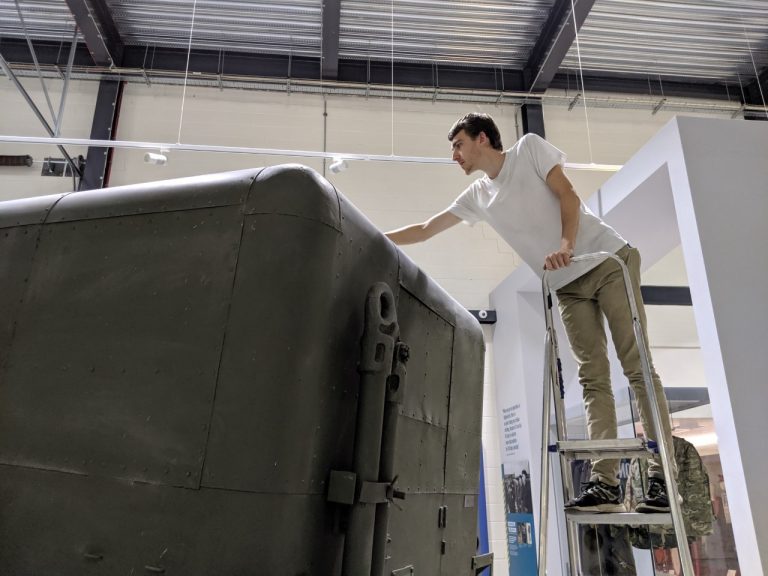
Before I started in conservation, I studied Modern History and Politics for my undergraduate degree at Royal Holloway, University of London. I have always had a keen interest for history, particularly twentieth-century history surrounding the two world wars. I focussed on these topics during my three years there, writing my dissertation on the symbolism of the Berlin Wall.
Towards the end of my degree I had begun my application with the Royal Air Force. Unfortunately, I was unsuccessful, but that failure set me on my current course. I have always enjoyed museums. My favourite museum when I was younger was the Museum of Science and Industry, Manchester, and I have always been keen to explore new museums. I knew I would want a career in museums and had begun exploring various roles while I was studying my undergraduate degree.
Conservation stood out to me as a role I would enjoy. I had always enjoyed hands-on lessons in science at school. The role stood out to me for being able to blend my love of history with practical skills. My past degree certainly helps me when understanding the context and significance of objects.
Caitlin Jenkins, MSc Conservation Practice (2nd year)
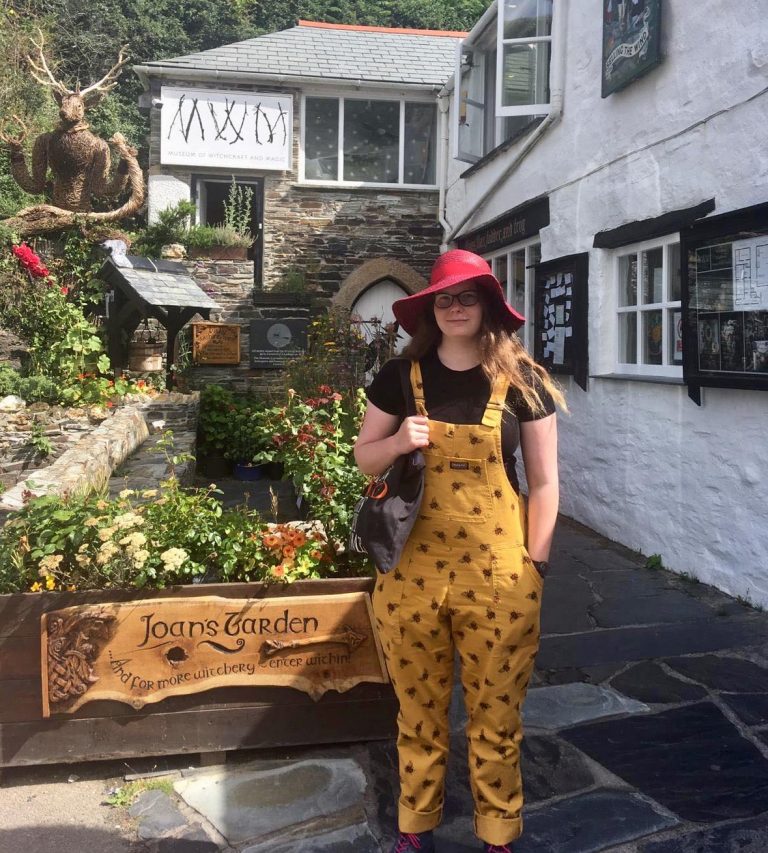
My path towards conservation was not straightforward. As an undergraduate I studied English Language and Literature at King’s College London. Much of my work there was based around issues of spirituality, physicality and psychological turmoil. A research fellowship during my second year based on early modern letters first sparked my fascination in conservation, particularly the ethics of conserving personal and ephemeral objects. When I decided to do a master’s degree, I was keen to return to my hometown of Cardiff to study there. Outside university, I’m an enthusiast of heritage crafts and take classes whenever I have the time – from blacksmithing to stained glass or fan-making, I’ll give anything a try! It’s always fun to see how traditional skills can inform my practice.
I think my previous degree has certainly shaped my conservation practice. I often find myself ‘reading’ an object the same way as I would a literary text, piecing together minute clues and nuances in order to get a sense of its ‘story’. While a necessary outcome of postgraduate study is specialisation, a more interdisciplinary approach can be helpful for conservation, because you’re unlikely to be faced with exactly the same problem twice. I enjoy being able to think laterally and to utilise skills and knowledge from other areas.
Ellie Evans, MSc Conservation Practice (2nd year)
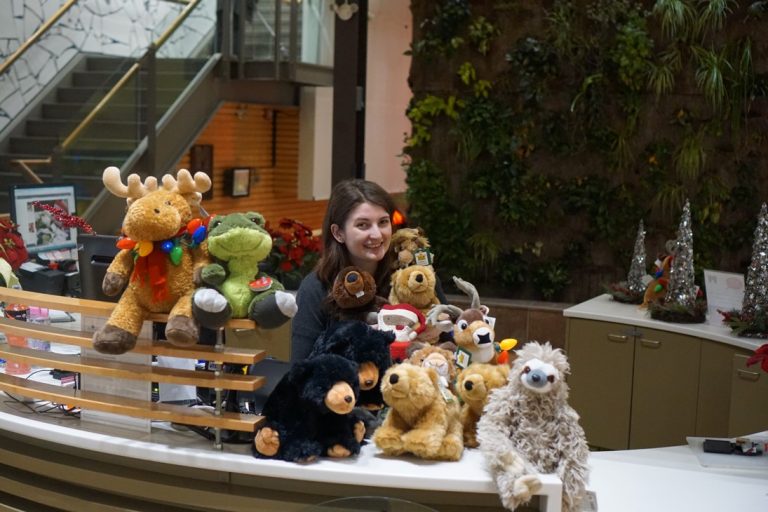
I studied BA Hons Egyptology at the University of Liverpool (2013-16). This degree involved learning to translate ancient Egyptian hieroglyphs, archaeological excavations, and interpreting evidence from ancient Egyptian cultures. During my degree I also studied abroad for a semester at the University of Toronto, where I was able to experience a different learning system and wider modules such as Archaeology of the Land of the Bible and the History of Architecture. I graduated from this degree in 2016.
After graduating I moved home and started working full time at a college, whilst I also studying a distance learning Master’s degree in ‘Heritage & Interpretation’ with the University of Leicester (2016-18). This degree allowed me to gain further skills and insight into the heritage sector whilst I worked.
In 2017, I moved to Toronto where I started working full time in a financial firm and I volunteered at the Royal Ontario Museum (‘ROM’), later in the year I moved to Kitchener where I worked full time as the Visitor Services Coordinator at ‘THEMUSEUM’ (whilst continuing to volunteer at the ROM). It was during this time I realised I wanted to work directly with museum objects and MSc Conservation Practice at Cardiff University was the perfect route into this.
Emily Franks, MSc Professional Conservation
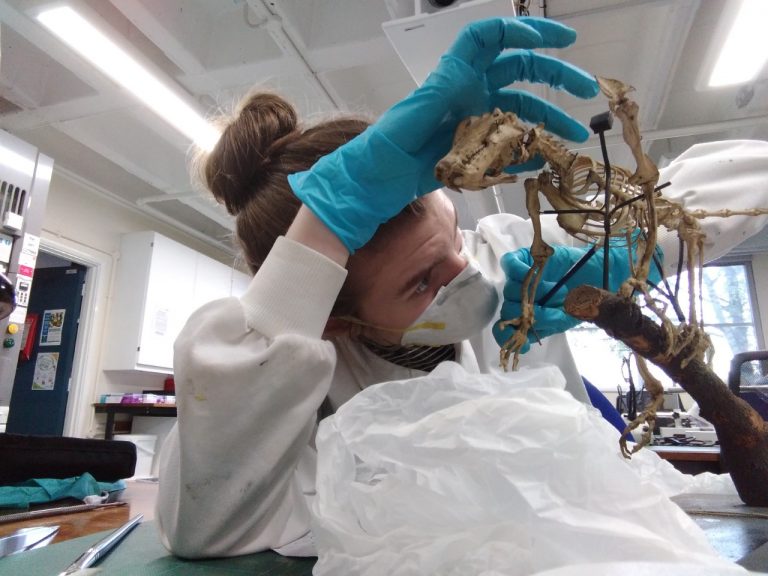
I have always loved history, throughout the entirety of my childhood, so I knew I would do something related from a very early age. In 2008 when I was 10 years old, I was studying the Vikings at primary school (Year 5) so my parents took me to the Jorvik Viking Museum Centre up in York to learn more. They had an interactive area where kids could ‘dig up stuff’ in foam beads emulating an archaeological dig, and a group of us also handled some artefacts and tried to guess what they were – including fossilised poo! I left thinking ‘This is so cool, I want to do this when I’m older’. When I was 11 and started high school and science lessons with Bunsen Burners and chemicals and all that, I was talking to my parents about archaeologists and how they’re in the cold and bad weather (and how much I loved the science), and they said to me ‘well, why don’t you be someone who cleans the stuff?’. To 11-year-old me, this was fascinating and perfectly combined my two newfound loves. I was like ‘that’s a job? That’s so cool!’ And to this day, 10 years later, nothing yet has become ‘cooler’ than conservation.
Mandy Garratt, MSc Conservation Practice 2017-19
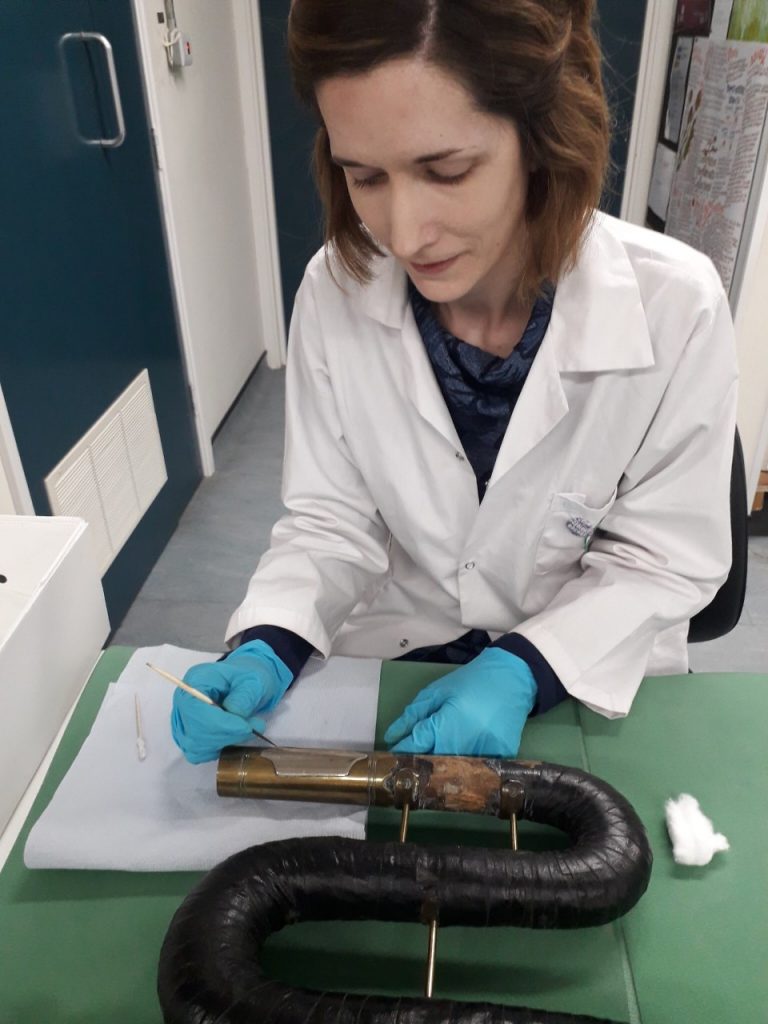
Before studying conservation at Cardiff I worked for 12 years at a large financial institution, initially working in Staff Pensions Administration and then as a Website Developer. Although I had a stable job and worked alongside a great team, I was uneasy about working in the virtual domain and knowing that my work could be easily erased and I needed a new challenge. I had been studying for a BA Hons degree in Humanities with the Open University while working, and my studies reminded me how much I love history, science and the arts, and I craved working with tangible objects. I discovered conservation through a documentary about Chatsworth House in Derbyshire and seeing a Conservation Assistant methodically cleaning hundreds of tiny shells and I said out loud “I’d love to do that!”. From there, it was a fairly complicated journey for me, being a mature student with family commitments and unable to relocate. I studied for an MA in Preventive Conservation at Northumbria University via distance learning, but after graduating I realised that the type of work I wanted to do required training in objects conservation and I took the huge step of studying at Cardiff, facing a two hour commute each way, but my passion kept me going and I haven’t looked back!
- March 2024 (1)
- December 2023 (1)
- November 2023 (2)
- March 2023 (2)
- January 2023 (6)
- November 2022 (1)
- October 2022 (1)
- June 2022 (6)
- January 2022 (8)
- March 2021 (2)
- January 2021 (3)
- June 2020 (1)
- May 2020 (1)
- April 2020 (1)
- March 2020 (4)
- February 2020 (3)
- January 2020 (5)
- November 2019 (1)
- October 2019 (1)
- June 2019 (1)
- April 2019 (2)
- March 2019 (1)
- January 2019 (1)
- August 2018 (2)
- July 2018 (5)
- June 2018 (2)
- May 2018 (3)
- March 2018 (1)
- February 2018 (3)
- January 2018 (1)
- December 2017 (1)
- October 2017 (4)
- September 2017 (1)
- August 2017 (2)
- July 2017 (1)
- June 2017 (3)
- May 2017 (1)
- March 2017 (2)
- February 2017 (1)
- January 2017 (5)
- December 2016 (2)
- November 2016 (2)
- June 2016 (1)
- March 2016 (1)
- December 2015 (1)
- July 2014 (1)
- February 2014 (1)
- January 2014 (4)